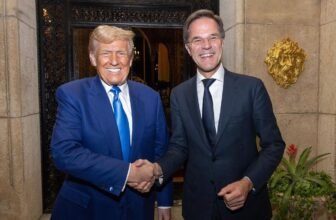
In a wave of recent diplomatic maneuvers, President Donald Trump has shifted U.S. foreign policy in a way that many interpret as benefiting Russia, sparking concerns among European allies and officials in Ukraine.
U.S.-Russia Talks Exclude Ukraine
On February 18, high-level meetings took place between U.S. Secretary of State Marco Rubio and Russian Foreign Minister Sergey Lavrov in Riyadh, Saudi Arabia. However, Ukrainian representatives were absent, raising concerns in Kyiv and across Europe. The exclusion of Ukraine from discussions about its own future has been widely criticized by officials and analysts.
Trump’s Criticism of Zelensky
President Trump has openly questioned Ukrainian President Volodymyr Zelensky’s leadership, suggesting that Ukraine should hold new elections. He further claimed—without evidence—that Zelensky’s approval rating is as low as 4%, while independent polls indicate significantly higher numbers. These remarks have been perceived as an attack on Zelensky’s legitimacy at a time when Ukraine faces severe challenges.
Proposed Economic Concessions for U.S. Military Aid
The Trump administration has proposed that Ukraine allocate a significant portion of its economic resources, including revenue from natural resources and infrastructure, as repayment for U.S. military aid. Critics argue that this demand places an excessive burden on an already war-torn country, raising ethical concerns about the use of aid as leverage for economic gain.
Potential Withdrawal of U.S. Troops From NATO’s Eastern Flank
Reports suggest that President Trump is considering withdrawing U.S. forces from NATO’s frontline positions in the Baltic states, including Estonia, Latvia, and Lithuania. This potential shift could leave these nations vulnerable, align with Russian interests, and disrupt regional stability. The prospect of reduced U.S. military presence has alarmed Eastern European allies, who rely on NATO’s security guarantees.
Concerns from European Allies
European leaders have expressed frustration over being excluded from the U.S.-Russia negotiations. The lack of Ukrainian and major European representation in these talks has raised fears that agreements may be made without considering wider European security concerns. There is a growing demand among European officials for more inclusive discussions that respect Ukraine’s sovereignty and involve all affected parties.
FAQ: Key Questions Answered
Who was excluded from the recent U.S.-Russia talks?
The U.S. administration has not provided a clear explanation for Ukraine’s absence in the negotiations. This decision has been widely condemned for sidelining a key stakeholder in discussions about its own future.
What does the potential withdrawal of U.S. troops from the Baltics mean?
A reduction in U.S. military presence in the Baltic states could weaken NATO’s deterrence strategy, making the region more vulnerable to Russian aggression.
How are European leaders reacting to these developments?
European leaders have strongly criticized these moves, urging inclusive negotiations that involve Ukraine and respect its sovereignty.
These actions carry significant implications for the geopolitical landscape and could reshape alliances and power dynamics in Eastern Europe.
What are your thoughts on these developments? Share your views in the comments section below!






